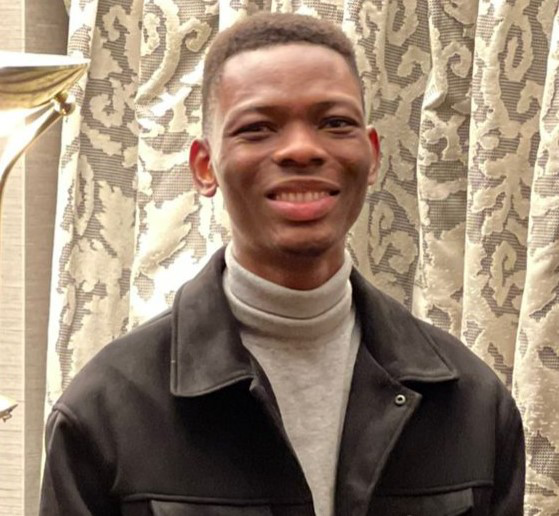June 4, 2025

Barnabas Agbodekhe holds a B.Eng. in Chemical Engineering from the University of Benin, Nigeria, and an M.Sc. in Advanced Chemical Engineering from Imperial College London, UK. He is currently a Ph.D. candidate, advised by Prof. Edward J. Maginn in the Department of Chemical and Biomolecular Engineering. His doctoral research efforts are directed towards addressing challenges hindering the phaseout of harmful greenhouse gases known as hydrofluorocarbons (HFCs).
HFCs are the predominant chemical working fluids used in refrigeration, heating, ventilation, and air-conditioning (RHVAC) systems. However, HFCs used in these RHVAC systems generally have high global warming potential, meaning they cause a lot of global warming (much higher than even CO2) and threaten the sustainability of our planet.
Barnabas leverages several data-driven methods and tools, such as molecular modelling and simulation, and machine learning, to discover and understand materials for addressing the technical challenges associated with the phaseout and replacement of HFCs, for the betterment of society.
What or who inspired your research and its applications to society?
I desire to make a meaningful impact on society, especially in the areas of energy and environmental sustainability. This has been a running theme throughout my research endeavors, beginning from my undergraduate research experience, through my Master’s research, and now my doctoral study. Specifically, I am thrilled about applying computational data science techniques for discovering and understanding materials and phenomena that have applications in the areas of energy and environmental sustainability.
HFCs cannot be phased out without competitive replacements, and so I am working to discover new, environmentally friendly chemical fluids to replace HFCs in RHVAC systems. The tremendous impact that these research undertakings can have on society, even if only partially successful, has provided me with immense motivation.
I have also enjoyed excellent mentorship and support from my Ph.D. advisor, Prof. Edward J. Maginn, who has allowed me to thrive and pursue my unique path in research. I am inspired by a quote from Sharon Begley, following her interview with Carl Sagan: “Somewhere, something incredible is waiting to be discovered.” While this quote likely referred to extraterrestrial possibilities, which is related to Carl Sagan’s work, I think it also applies to many other things, including molecules, those made and those yet to be made, that could prove to be transformative for human well-being and society on planet Earth.
What is the most valuable lesson you’ve learned about collaboration from working with people outside of your field?
Collaborating with people outside your field has a multiplier effect in terms of research and societal impact. Real problems often require an interdisciplinary approach. My research is funded by the National Science Foundation (NSF) and involves a large consortium of domain experts, including behavioral science experts, chemists, engineers, economists, and so on. I have learned that communicating research, even if highly technical and domain-specific, in a way that is accessible to a broader audience, will lead to better cross-pollination of ideas and ultimately to much greater impact in both the scientific community and society in general. Being a Lucy Graduate Scholar has helped me greatly hone my research communication and storytelling skills.
How has the Lucy Family Institute contributed to your development as a research scholar?
I have experienced remarkable improvement in research communication and my ability to think about my research in the context of how it benefits society. I have also seen how many of the tools and methods used in other fields could be useful in my own research and vice versa. Importantly, I have developed meaningful connections with other scholars outside my discipline, which I hope to maintain for the rest of my career.
To learn more about the Lucy Graduate Scholars program, please visit the webpage.